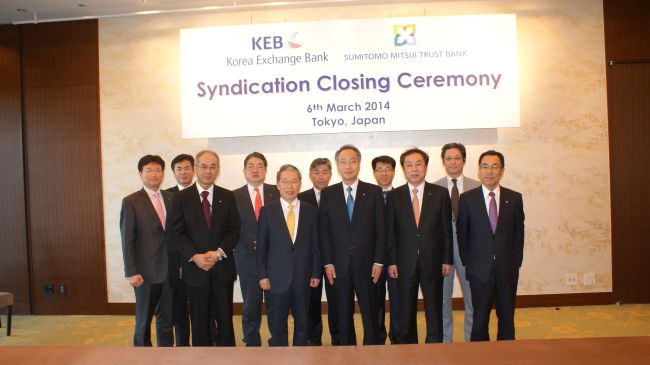Korea Exchange Bank, hand in hand with a Japanese partner, made its entry into Europe’s prime real estate finance market by contributing a syndicated loan to a prestige real estate funding project in the U.K., the company said in a press release on Thursday.
This is to be the first case of a Korean bank participating in a syndicated loan in the overseas real estate market and also the first example of overseas project financing cooperation between Korea and Japan.
KEB, jointly with Japan’s leading SuMi Trust Bank, is to offer a syndicated loan worth 84 billion won ($79 million) for the purchase of a high-level office building in the Central Business District in London, officials said.
 |
Korea Exchange Bank president Yun Yong-ro (front row, second from left) and Japan’s SuMi Trust Bank president Hitoshi Tsunekage (front row, third from left) pose at a ceremony in Tokyo on Thursday. The two banks agreed to offer a joint loan to a high-end office building purchasing project in London. (KEB) |
The two banks agreed to cover the amount 50-50 and held their deal-closing ceremony in Tokyo on Thursday.
The event was the first visible outcome of the memorandum of understanding signed in June last year, in which the two banks pledged to cooperate in overseas banking business, according to KEB officials.
While the majority of the amount is covered by the Korea-Japan entity, the remainder of the 141 billion won project is to be loaned by a Luxembourgian investor.
A syndicated loan, in which a number of lenders jointly structure a lenders’ group, is a dominant way for the U.S. and European companies to raise funds for large projects.
Last November, KEB was also selected as the financial manager of London’s Prime Office Building, beating a number of renowned local banks and stepping foot into the European market.
“This model of Korea-Japan financial cooperation is to be the first successful case of global business expansion, which KEB has long sought to achieve,” said KEB president Yun.
“We hope that our business may also activate the recently stalled economic relations of the two countries.”
By Bae Hyun-jung (
tellme@heraldcorp.com)






![[Exclusive] Hyundai Mobis eyes closer ties with BYD](http://res.heraldm.com/phpwas/restmb_idxmake.php?idx=644&simg=/content/image/2024/11/25/20241125050044_0.jpg)

![[Herald Review] 'Gangnam B-Side' combines social realism with masterful suspense, performance](http://res.heraldm.com/phpwas/restmb_idxmake.php?idx=644&simg=/content/image/2024/11/25/20241125050072_0.jpg)